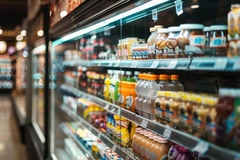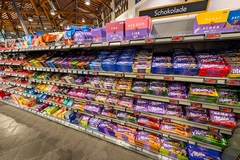Dutch companies and Brazilian soy producers signed the agreements for the delivery of 280,000 tons of RTRS-certified soy on 22 November in Rotterdam. With this the Foundation for Responsible Soy Chain Transition accomplishes a doubling of the purchase in comparison with 2011.
04 Dec 2012 --- Dutch companies throughout the entire chain, from animal feed producers to retail, have agreed to gradually switch to 100% responsible soy and soy products for the production of meat, dairy, eggs and other foodstuffs in the Netherlands starting now until the end of 2015. The doubling to 280,000 tons of responsible soy with RTRS certification shows that the parties are on the right track. With this 16% of all soy and soy products processed in the Netherlands has been cultivated in a responsible way.

Henk Flipsen, chairman of the Foundation for Responsible Soy Chain Transition, is satisfied. “With the purchase of responsible soy we show that Dutch companies are committed to working with sustainable raw materials. This is a clear signal towards the soy producers in South America that there is a demand for responsibly cultivated soy. Besides, we work together with European partners on the sustainability of the major trade flow for soy. Eventually, responsible soy must become the standard for the entire European market.”
Soy is one of the most important agricultural crops in the world and a substantial raw material for animal feed and many foodstuffs. Responsible soy has been cultivated in accordance with the principles of the Round Table on Responsible Soy (RTRS) or equivalent. This implies that attention was paid to nature conservation, biodiversity, responsible use of pesticides, good labour conditions and respect for local land rights. Apart from the 280,000 tons of RTRS-certified soy, the foundation has also purchased 120,000 tons of soy that has been certified in compliance with a limited set of criteria. This soy comes from soy producers that are taking steps towards compliance with the criteria for RTRS certification. A complete overview of RTRS criteria is to be found through www.verantwoordesoja.nl. VION is one of the RTRS members.
Civil society organisation such as Natuur & Milieu, Solidaridad and the World Wildlife Fund are closely involved in the development of the international criteria for RTRS and support the objectives of the Foundation for Responsible Soy Chain Transition. Nico Roozen, director of Solidaridad: “The ambition of Dutch companies to be an international driver in the use of responsible soy is a major stimulus for a sustainable soy chain. Responsible soy is a vital step towards soy cultivation with care for people and the environment.”
The Foundation for Responsible Soy Chain Transition was founded in March 2012 and stemmed from the Dutch Initiative Sustainable Soy (IDS) and the Task Force Sustainable Soy. Organisations involved in the plan are The Netherlands Feed Industry Association (Nevedi), The Dutch Sustainable Trade Initiative (IDH), the Dutch Dairy Association (NZO), the Dutch Meat Association, Albert Heijn, C1000, Jumbo, Lidl, Superunie as central purchaser for 13 supermarket chains, the Dutch Product Board for Poultry and Eggs and the Dutch Product Board for Margarine, Fats and Oils. World Wildlife Fund, Natuur & Milieu and Solidaridad, as well as LTO, the Dutch Federation of Agriculture and Horticulture, support the objectives of the foundation. The Foundation for Responsible Soy Chain Transition is working on upscaling the use of responsible soy in the animal feed and food industries. The foundation is also working on laying down commitments in binding quality agreements about soy in the entire chain, from retail to supply industries to animal feed manufacturers.
Soy is a one-year crop that yields an edible bean with high protein and fat contents. The main part of the soy harvest (94%) is pressed, thus producing soy flour and soy oil. The high-protein soy flour (soy meal) is an important raw material for animal feed for, among others, pigs, chickens and cattle. This implies that soy flour is, among other things, used for producing eggs, dairy and meat. Soy flour is also processed in noodles, infant nutrition and breakfast cereals. Soy oil (and soy lecithin) are often used in foodstuffs, such as margarines, soups, mayonnaise and chocolate as well as in care products, for example detergents or even paint.












